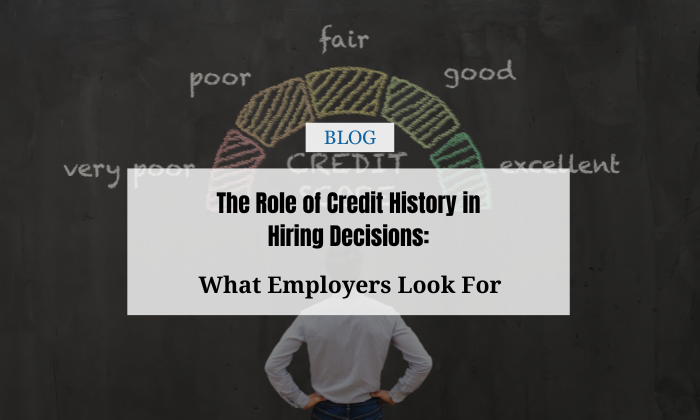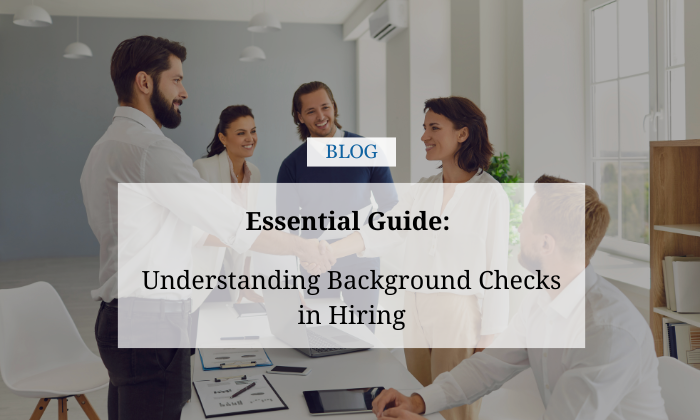So, you’ve got that job offer in writing, maybe even hammered out the details on salary and perks. But, here’s the twist: your potential employer wants to take a peek at your credit history before sealing the deal. Sounds a bit random, right? Well, turns out, it’s actually pretty important.
See, employers tend to see your credit history as a window into how responsible and savvy you are with decisions. Especially for gigs where you’ll be handling money or sensitive stuff, they want to make sure you’re solid. So, they might dive into your credit report to get a better feel for your financial habits and overall stability before making the final call on hiring you.
Why Do Employers Check Your Credit Score?
Around 51% of employers these days are tossing credit checks into the mix when they’re sizing up potential hires. Yup, it’s becoming pretty standard practice in the job hunt game.
Why? Well, picture it like this: Companies, especially those in the finance or government scenes, need to know they can trust the folks they’re bringing on board. So, they’re digging into credit histories to get an extra read on candidates and spot any possible warning signs.
Think about it: having a load of loans or maxed-out credit cards might raise some eyebrows and make them wonder if you’re a bit scatterbrained or not great with money. And if there’s a trail of late payments? That could set off alarm bells, making them worry about potential shenanigans like theft or fraud.
At the end of the day, employers just want to make sure you’re the right fit for handling the company’s finances or sensitive info. And here’s the kicker: even if they don’t ask for credit checks upfront, don’t be surprised if they come knocking later down the line, especially if you’re up for a promotion.
What Do Employers Look for in Credit Checks?
Ever wonder why employers sneak a peek at your credit history? Well, it’s like this: they’re trying to get a feel for how you juggle different priorities and handle money matters. One big thing they’re eyeing? Whether you’re on the ball with paying bills and debts on time.
But it’s not just about punctuality. They’re also sizing up how you manage your debts overall. If you’re swimming in debt or showing signs of financial strain, they’re going to take notice, especially if the job you’re gunning for involves handling cash or sensitive financial info.
And it’s not just about the here and now. They’re diving into your credit history to know your overall money moves. Your past habits could either cement your reputation as a financially savvy whiz or raise a few eyebrows if you’re eyeing a gig that requires making big financial calls or having access to sensitive data.
What Do Employers See in a Credit Check?
If a credit check is part of your pre-employment background checks, employers typically see a summary of your credit history, which includes several key financial details, but not your credit score.
Here’s what employers generally have access to:
- Available credit
- Bankruptcies
- Collection accounts
- Credit inquiries
- Debt-to-income ratio
- Employment history
- Indicators of financial mismanagement
- Payment history
However, a pre-employment credit check will not include personal information that could violate the same employment laws that limit interview questions. Questions regarding your marital status, account numbers, exact credit score, race, or birth year, for example.
Remember, the employer’s goal in conducting a credit check is typically to assess financial responsibility, especially for positions involving financial duties or handling sensitive information.
Know Your Rights
Here’s the deal with your rights when it comes to job-related credit checks:
- Your potential employer has to tell you they’re going to check your credit before they do it, and you have to say it’s okay in writing.
- They can’t slip it into the job application, it has to be a separate notice.
- If they decide not to hire you because of something they find in your credit report, they have to give you a heads-up with a document called a pre-adverse action disclosure. This includes a copy of the report and info on your rights from the Federal Trade Commission.
- Once they’ve made up their minds for sure not to hire you, they have to send another notice explaining why, and how you can argue if there’s something wrong in your report.
- If you say no to the credit check, they can still say no to hiring you. Just remember, some states have their own rules about how bosses can use credit reports when hiring, so it’s worth checking before you refuse.
How to Prepare for a Pre-Employment Credit Check
Never assume you know what’s on your credit check. Use the following steps to verify and update your credit report as a part of your job search strategy.
1. Check Your Credit Report and Credit Score: If it’s been a while since you’ve checked your credit, pull your report before starting a job search. Every consumer is allowed one free credit report every year from each of the credit bureaus: TransUnion, Equifax, and Experian. You can go to AnnualCreditReport.com (the official site for free credit reports) and pull your free reports.
2. Ask for Revisions: If you’re part of the one-third of Americans who discover an error on your credit report, you can dispute the information. Each company has a dispute process, and they have 30 days to investigate your request.
If the company decides not to change your record, you can always add a consumer statement to yours. You can include a general statement that addresses your entire credit history, or an account-specific statement.
Note that recommendations vary on the wisdom of adding statements to your credit report. Ensure you research your specific situation to decide if a consumer statement is the best choice for you.
3. Unfreeze or Unlock Your Credit: Have you frozen your credit report? It’s often a smart move to restrict access to your credit report to prevent identity theft, making it harder for fraudsters to open accounts in your name. However, a credit freeze will also restrict legitimate businesses from accessing your report, which includes your prospective employer.
To do this, contact each of the major credit bureaus. You’ll need to provide your personal identification and the PIN or password set up when you initially froze your credit.
You can choose to lift the freeze for a specific time or for a particular creditor. Keep in mind that the employer often works with a third-party background check company, so there can be variances in the business name. You can set a calendar reminder to refreeze your credit after the employer has the information they’re seeking.
4. Work to Improve Your Credit: Feel like it’s too late to work on your credit before an employer sees it? Think again. The Bureau of Labor Statistics (BLS) reports that the average time frame for unemployment is five months. This means your job search could be a bit shorter—or longer—than that.
Regardless, several months is sufficient time to make noticeable improvements on your credit report. Start by consistently paying your bills on time whenever possible. Payment history is a major factor in your credit score. Aim to reduce your debt, especially on credit cards, to lower your credit utilization ratio. Consider freelancing or taking on a side hustle to bring in a little extra income.
Additionally, avoid opening too many new credit accounts in a short period, as this can negatively impact your score. If you’re struggling to meet your financial obligations due to a recent layoff or job loss, ensure you’re communicating with lenders. You might discover that some are willing to negotiate lower payments until you’re employed again.
5. Be Proactive: Communicate With the Employer
Because the employer must provide your written notification before pulling the report, you have the opportunity to give the employer a heads-up about any negative information that may appear on your report.
Say you fell behind paying a credit card bill. You could explain that you were laid off recently or unemployed for a few years while caring for a sick relative, but you’ve worked out a payment plan with the credit card company and are now diligently making on-time payments.
Work with a background check provider like Securecheck360
Here at Securecheck360, we’re experts in delivering reliable, fast turnaround and affordable Employment Background Screening Services, serving businesses of all sizes across the globe. Our customized solutions are finely tuned to meet the unique requirements of small, mid-sized, and large organizations. We’re dedicated to equipping companies with the vital tools and insights they need to make well-informed hiring choices. As one of the leading background verification companies, we’re committed to supporting even small businesses as trusted background check companies for small businesses to ensure they have the confidence to build the best teams for their success.
To know more about our services, book your free demo today!
Bottom Line
Knowing how credit history factors into hiring decisions helps us see why employers care about it. Even though it might not seem related to the job at first, your credit history shows how responsible you are with money. This is super important, especially for jobs where you handle finances or sensitive stuff. By understanding this, both employers and job seekers can make better choices during the hiring process, making things fairer for everyone involved.







